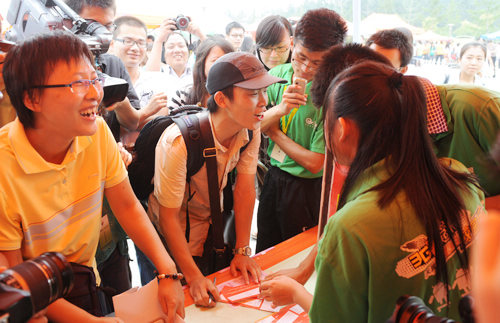|
 |
|
CHANGING: Jia Zuosheng (second left), a former security guard at the library of Tsinghua University, registers at Shandong Normal University on September 4 (XINHUA) |
This year, some colleges and universities in China have found it more difficult for them to recruit new students than before. Take Shandong Province for example, it is reported that the freshmen enrollment rate of some colleges and universities has been falling in the past year, especially for vocational schools, private or small colleges.
Against the background of industrialization of the education industry, students are the source of finance for colleges. However, statistics show that in 2010, China had 2,358 colleges, an increase of 54 schools over the previous year.
In the past decade, because of the growth of recruitment, colleges have developed on large scales in various aspects. But if enrollment begins to shrink, reducing the scale of colleges means a huge loss of resources. Many colleges have applied for huge loans from banks to expand their campuses or upgrade facilities.
If colleges stop focusing on immediate economic interests and begin to train talent suited to market demand, the current enrollment problem will likely be resolved.
China Youth Daily
Chinese chemist Tu Youyou was the recipient of the 2011 Lasker-DeBakey Clinical Medical Research Award for her contribution to the discovery of artemisinin, a drug used to treat malaria which has saved millions of people's lives in developing countries. Tu is not a member of the Chinese Academy of Sciences and does not have a doctoral degree, either. Unknown to the public for decades, Tu has finally gained the recognition she deserves after decades of hard work.
What we need to learn from Tu's success is to reevaluate China's academic research, which emphasizes more short-term prizes and awards but not long-term value. Tu was presented with the award for the anti-malaria drug she discovered in the 1970s, almost 40 years ago. This reminds us academic research should stand the test of time.
In China, generally speaking, academic plans must be accomplished within three to five years. Furthermore, some researchers apply for prizes before research is finished. With a driving force from economic benefit, the quality of academic research has been seriously damaged.
Apparently, the relevant departments haven't thought deeply about this problem but are still adopting traditional planning and management patterns. By organizing key programs and selecting especially cultivated talent for academic research, they wish for breakthroughs and great strides in academic development in short periods of time. Their ideas run counter to the principles of academic research and cause chaos in the field. More valuable academic fruits will apear if scholars are given a free environment and the administrative forces are chopped from the academic field.
Beijing Youth Daily
It's reported during the past 17 years, more than 300 security guards at Peking University (PKU) have themselves become students at the university. Some have gained bachelor's degrees, some master's degrees and some even become university teachers after graduation.
PKU has set a very good example for society in creating a good environment to encourage learning. First, for a long time, PKU has had a very good tradition of allowing all people to attend lectures free of charge, so as to allow greater numbers of people to have access to good teachers at the university. This tradition shows the university's efforts in offering equal opportunities to everybody.
Second, PKU humanely manages non-student groups on its campus. For instance, if security guards thirst for knowledge, their administrative department offers the most convenience possible, including giving them more time for study by rearranging schedules for their work. This considerate system helps those guards realize their dreams.
Finally, there are good platforms in the university for different groups to communicate with each other, offering people in lower classes hope of progress. Teachers in PKU are encouraged to donate books and computers to security guards.
If the whole of society encourages people to study as PKU has done for its security guards, and different groups have more convenient channels to communicate equally with each other, more people will be stimulated to strive for brighter futures.
Beijing Youth Daily
September 20 this year was the second China Statistics Open Day. At the activities on the day jointly held by China's National Bureau of Statistics (NBS) and Beijing Municipal Statistics Bureau, many people expressed their doubts about why the growth rate of Consumer Price Index (CPI) issued by the NBS is so low, while the actual price increase rate of many daily products is so high. The NBS officials explained that the CPI is a figure that covers eight major types of commodity and service consumption prices, while ordinary people are more sensitive about the price of daily commodities and services.
But the fact is that at present, most Chinese families belong to the middle- and low-income classes, so they are very concerned about such things as pork prices.
The CPI reflects the price changes in daily commodities that are closely related to the quality of most peoples' living standards. Normally speaking, the CPI should be as close to the ordinary people's requirements as possible, instead of being greatly distanced from their feelings about commodity prices.
The CPI is used by government departments as a reference for policy-making, so if there is a huge gap between the statistics and people's feelings about commodity prices, the departments' decision making will be affected negatively and further influences the quality of people's life. It's important for the relevant departments to face up to the reality of the soaring price of commodities such as pork and take measures to stabilize the prices of daily commodities.
Xi'an Evening News | 